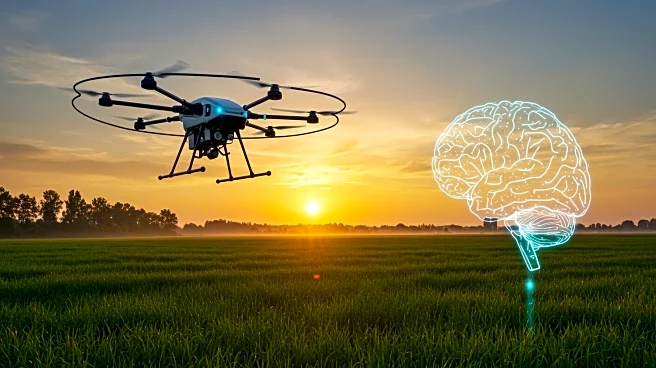What's Happening?
The integration of drones, artificial intelligence (AI), and the Internet of Things (IoT) is transforming agriculture, with drones expected to become essential tools for data-driven farming by 2025. These technologies enable farmers to maximize yields, optimize resource use, and implement precision agriculture practices. By 2025, over 30% of large farms worldwide are projected to utilize AI-powered drones for agricultural operations. The global market for agriculture IoT devices is expected to surpass $30 billion, driven by rapid tech adoption. Drones equipped with multispectral cameras and GPS provide detailed data for crop analysis, while AI and IoT integration automate and connect these tools for efficient farm management.
Why It's Important?
The use of drones, AI, and IoT in agriculture addresses challenges such as labor shortages, climate change, and the need for sustainable farming practices. These technologies provide actionable data, reduce labor costs, and improve accuracy in field analysis and operations. Continuous, data-driven monitoring allows farmers to optimize farm management, from planting to harvest, enhancing efficiency and sustainability. The precision application of fertilizers and pesticides reduces chemical use and environmental impact, while irrigation management conserves water, crucial in drought-prone areas. These advancements make farms more competitive and scalable, benefiting both smallholder and commercial operations.
What's Next?
The future of agriculture will see further integration of drones, AI, IoT, satellites, and blockchain, creating a tightly automated ecosystem. Swarm drone technology will enable fleets to cover entire farm landscapes quickly, sharing data and tasks. Edge AI processing will allow rapid disease and pest diagnosis, reducing reliance on cloud processing. Full IoT integration will unify devices under centralized dashboards for maximum resource optimization. Government and private investments in technology infrastructure and training programs will accelerate smart farming across regions, promoting sustainable practices and food security.
Beyond the Headlines
The ethical and environmental implications of these technologies are significant. Precision farming reduces chemical runoff and conserves water, promoting environmental sustainability. Blockchain-based traceability solutions enhance food safety and market trust, providing transparency in agricultural supply chains. The shift towards data-driven agriculture may also influence regulatory frameworks and consumer expectations, emphasizing sustainability and traceability. As these technologies become standard, they could reshape the agricultural landscape, influencing global food security and ecosystem health.









